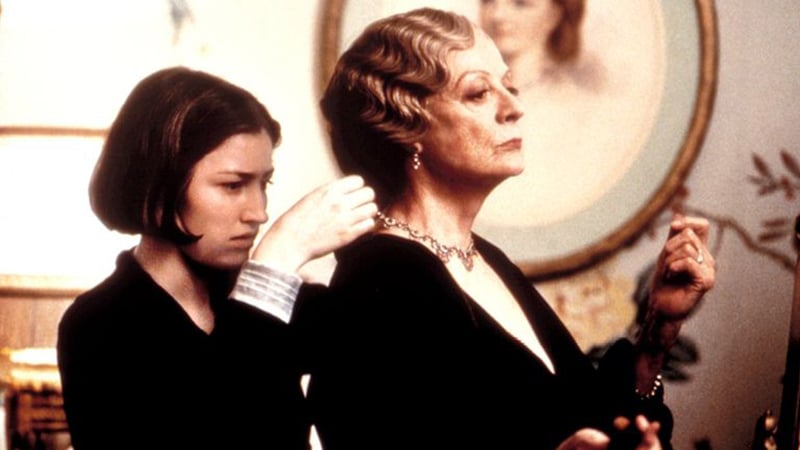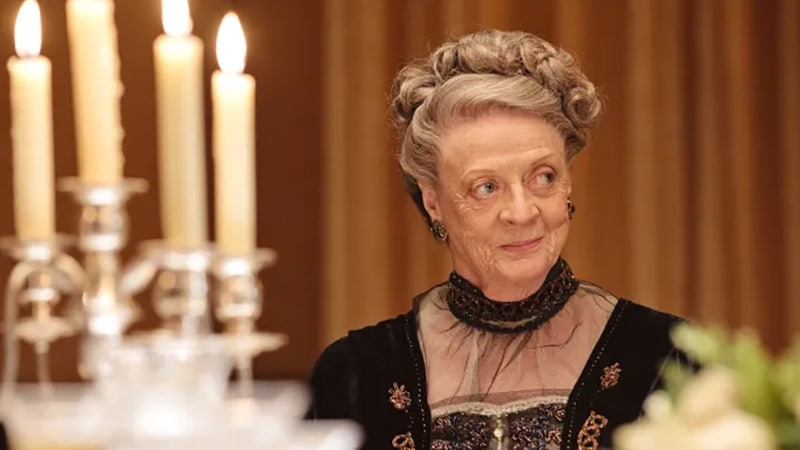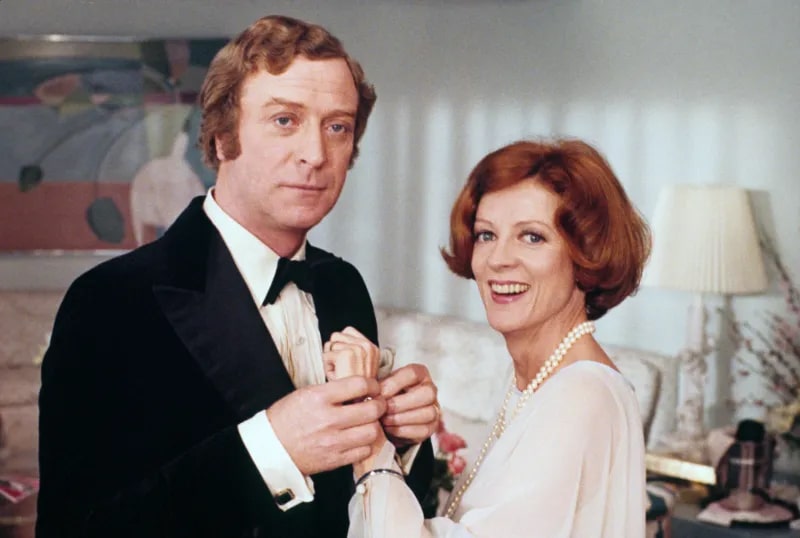Maggie Smith had the most expressive face. She could say and do more with a roll of an eye or a purse of her lips than most of her peers can with pages of dialogue. She could convey a world of disapproval or disappointment with even the slightest hiss of a sigh. Her face—a graceful and classical beauty—epitomized intelligence, vitality, and elegance.
A prolific thespian, she essayed some of the greatest roles of the theatre: Viola, Desdemona, Beatrice, Hedda Gabler, and Lady Bracknell were just some of the ferocious ladies of the stage that Smith embodies. She mastered the period film in film and television, her imperious elegance and tight reserve masking a shivering passion within. Though a great interpreter of tragedy and drama, Maggie Smith was the consummate comedienne, bringing that sharp, acidic wit to many comedies. As great of a dramatic actress as she was, comedy allowed her to shine brightest.
Take, for example, an amusing scene in Robert Altman‘s Gosford Park (2001). In the film, Smith is Constance, a broke yet proud socialite and dowager who mooches off her family’s generosity. A guest attending a shooting weekend at the titular country estate, Constance constantly alienates herself with her blunt and brusque manner. In one of Constance’s most amusing moments, she’s dining with the rest of the guests, including Morris Weissman (Bob Balaban), a film director, who had just finished sharing the pitch for his latest murder mystery movie with the rest of the diners. When questioned about the film’s resolution, Weissman refuses to say, pointing out, “I couldn’t tell you that. It would spoil it for you.” After a beat, Constance breaks the silence by saying, “Oh, but none of us will see it.”

The scene—especially the delivery—perfectly encapsulates Maggie Smith’s deadpan hilarity as a comedic actress. Though she had the talent and gravitas that made her a premier tragic actress, she was equally adept at being funny. The same qualities that lend themselves to the corset-and-bustle dramas also worked well in her comedies. Her characters always carried a heavy sense of contempt and wariness about the world. No matter their social or economic situation, Smith’s characters believed they were the smartest women in the room.
In Gosford Park, Maggie Smith is a conniving and scheming grasper, motivated purely by maintaining her allowance and enjoying the creature comforts that befit a high-society dowager. Constance was just one of many socialites and society matrons Smith played—women who waltzed into their scenes, regal and somewhat ridiculous. Smith welcomed the inherent funny in a prim and proper lady in an absurd situation. Though a versatile actress with a remarkable range, as a comedienne, Smith brought a mordant sense of humor to her roles. Her face was often an appalled mask of abhorrence or snobbery as she spat out one-liners and wisecracks in that curdled, effete voice.
Because Smith was a remarkably skilled technician, it seemed as if there was nothing she couldn’t do. From the most prestigious art house film to the most commercial mainstream popcorn flick, Smith brought that specific brand of razor-sharp wit to any role. Even in the most pedestrian project, critics would praise Smith, agreeing that she would bring dignity and style to any film, no matter how mediocre.
Of her work in comedy, she said, “I tend to head for what’s amusing because a lot of things aren’t happy. But usually, you can find a funny side to practically anything.” In her review of Niall Johnson’s 2006 film Keeping Mum, film critic Ruthe Stein called Smith “a champion lip purser” who is “always a treat to watch” when she’s “up to her old scene-stealing tricks”.

Stein referenced Maggie Smith’s ability to steal the show, which was never more evident than in her supporting role in the ITV drama Downton Abbey (2010-2015). Smith was more famous than ever for her flinty performance as Violet Crawley, the Dowager Countess of Grantham. For an actress who forged a decades-long career in film and stage, stumbling onto a new era of superstardom so late in her career must have been gratifying. Though the soapiest of soap operas in period clothing, Downton Abbey was a prime vehicle for Smith’s ability to spit out withering lines. Smith’s Violet was a veritable one-liner machine, placed in the center of her scenes like an imposing monument in a series of impressive hats. As funny as her icy delivery was, even funnier were her series of appalled takes, that aggrieved, open-mouthed reaction to the comings and goings around her, as she scanned the room with that inimitable piercing stare.
The other important role of note in Smith’s oeuvre is Herbert Ross’ 1978 film California Suite. Based on the stage play by Neil Simon, the film is an ensemble piece with an all-star cast, which includes Alan Alda, Michael Caine, Jane Fonda, Elaine May, Richard Pryor, and Waler Mathau, among others. Smith is paired with Caine, portraying Diana Barrie, an Oscar-nominated actress who has to contend with her gay husband. In retrospect, the role feels like an in-joke because though Diana lost the Oscar, Maggie Smith won her Academy Award for the role.
The interactions between Caine and Smith have a defanged Edward Albee feel as the two actors spar in their hotel room. Simon’s barbed script compliments Smith’s brittle, pointed delivery perfectly. She can create a comic performance that braids desperation, bitchiness, and bitterness. Only Maggie Smith could land these unpleasant notes with that precise, stiletto-like sharpness. It’s a work full of knowing, archness, and self-awareness. There’s also a slight daffiness to her self-possession that gives way to the script’s pathos. California Suite is a fine film, nothing more than a better-than-average comedy, but Smith’s work elevates the material with her pointed and compact characterization.

One of the great things about Maggie Smith’s career is that age—even advanced age—didn’t stop her. Because of Downton Abbey and the Harry Potter films, the actress seemed busier than ever in the last couple decades of her career. Instead of retiring, Smith had earned several new careers in her later years. For the San Francisco Chronicle, Tony Bravo astutely saw that her work in the Sister Act films opened her up to new audiences and her second, arguably more lucrative career. “As she became part of the zeitgeist in her 1970s and 1980s [on Downton Abbey],” he wrote, “I couldn’t help but feel that Violet was in some way Reverend Mother with a better wardrobe and that Sister Act had set the stage for Smith’s career-defining role.'”
In what is probably one of the most unique tributes to her career, Maggie Smith’s oversized place in pop culture was celebrated on RuPaul’s Drag Race in its sixth season, when on the annual Snatch Game episode, Seattle drag queen and comedian BenDeLaCreme won the challenge by channeling Smith in a remarkable performance. BenDeLa’s impersonation of Smith-as-Lady Grantham drew on several of the actresses’ idiosyncrasies, including the heavily pinched lips and the owl-eyed glare, along with delivering the line in a heavily snooty, aristocratic way. It was an affectionate parody of a wonderful comedic persona.
One of Maggie Smith’s funniest moments captured in her lengthy, storied career was her appearance on The Carol Burnett Show. Smith and Carol Burnett shared a silly faux Julie Andrews-like musical number celebrating their respective British and American cultures. It’s no surprise to see Burnett mug her way through the comedic tune, but it’s a joy to watch Smith lampooning her prim and proper elegant image by switching from an affected snooty British accent to a broad American accent as the lyrics switch from different cultural tropes of America and Great Britain.
It’s a fun ditty pointing toward the comedic work dominating her later career. She looked like she was having a ball. That joy that permeates her funny work makes Maggie Smith’s comedy so enthralling. It’s watching a pro doing what she loves and doing it great.

